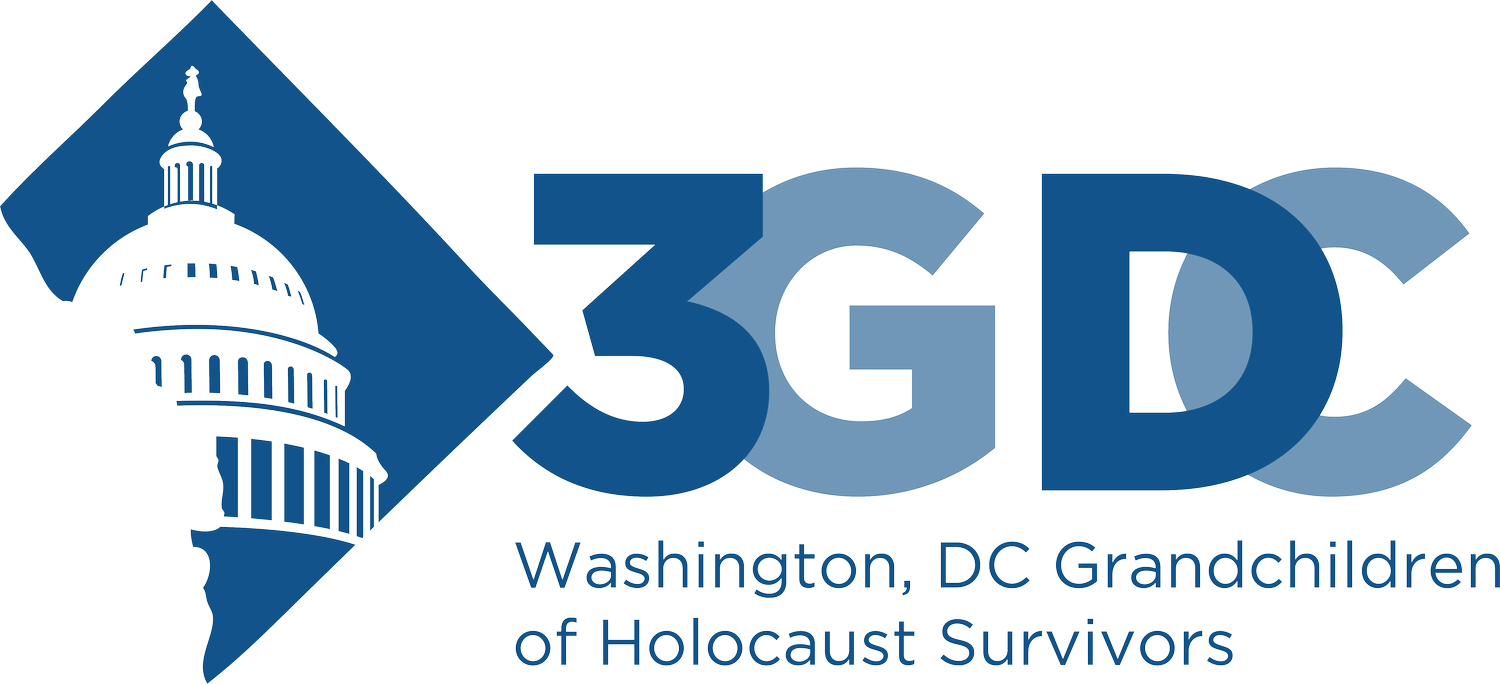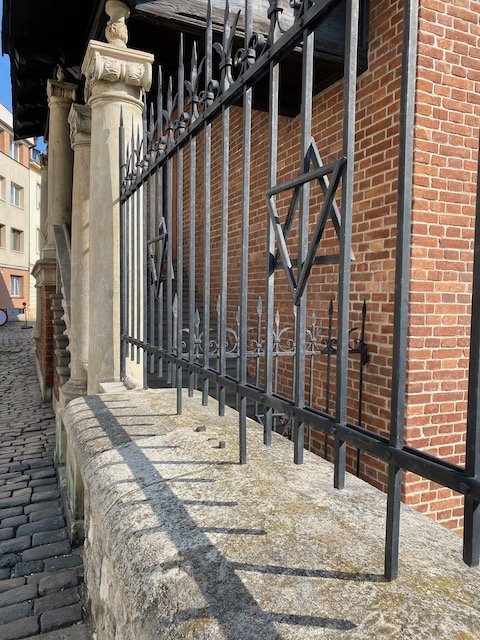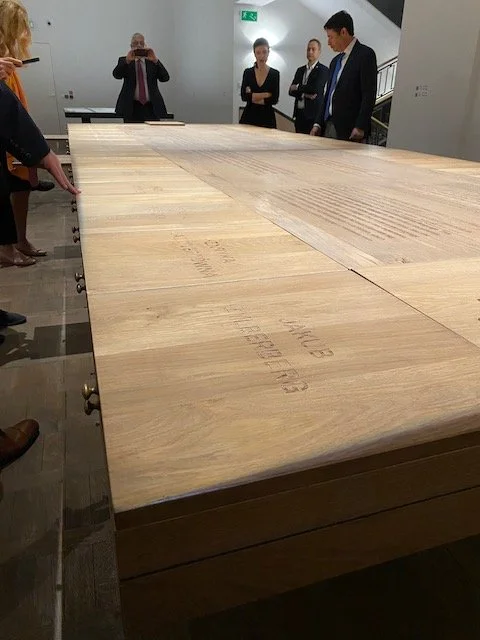A Polish Birthright
Guest Post by Rachel Lipman
July 10th, 2023
Yes, you read that correctly.
I’ve been on Birthright, you know, the trip that most young Jews make to discover and learn about the comprehensive history Jews have with Israel. So many people I know who went on Birthright talked about the feeling they had when their plane landed in Israel and the emotion that overcame them when visiting the Western Wall in Jerusalem. I love and feel connected to Israel. But, I also felt connected to Poland during my trip last week. For me, Israel was a religious experience to feel connected to the Jewish homeland and Poland was a heritage experience to feel connected to my family’s “recent” history.
For most of my life, my connection to my history has been influenced by my grandfather, his family history and his story of survival of the Holocaust. Most of the stories of my family’s history I grew up with were based in Poland.
My grandfather, William Loew, was born Wolfgang Löw in Lwow, Poland (now Lviv, Ukraine) in 1925 to a prominent family that made honey wine, also known as mead (miód pitny). When my grandfather would share stories of his family, he would speak about them and the family businesses in such a beautiful narrative, it made me feel like he grew up in a fantastical royal empire that was destroyed by the Soviets and the German Nazis. His homeland was used as the stage of onslaught of the Jewish people in Europe.
After escaping from Lwow to Budapest in January 1944, my grandfather joined a Zionist resistance movement. Soon after his arrival, he was ordered by the underground headquarters to deliver a message to a counterpart in Bucharest, Romania and was caught by the Hungarian Gendarmes. From there, he was assumed to be a Polish spy and was transported to the Budapest Political Prison where he was beaten and interrogated. On September 12th 1944, my grandfather was transported with 15 other prisoners to Auschwitz where he was imprisoned for about four months. In January 1945, he was transported to two other sub camps and then eventually to Flossenburg Concentration Camp. He was liberated on a death march from Flossenburg to Dachau by the US army on April 23, 1945. My grandfather would learn after the war, that he was the sole survivor of his family.
After my grandfather passed away last April, I felt and still feel his loss in many ways. I had the privilege to work with my grandfather for close to a decade producing wine and mead in tribute to his family history. We had a special and unique relationship. So, since he passed, I’ve continued to look for ways to stay connected with him.
In anticipation of the trip, I gathered all the documents I had found during my research of my family’s businesses and copies of documents of my grandfather from during the war. I was hoping to get some of the documents translated, while the others I was hoping to aid in learning more about my grandfather’s story of survival. Adrian Chrobot, the trip organizer and representative from the Embassy of the Republic of Poland who works with Jewish affairs was gracious to contact researchers before the trip so I could have the opportunity to find out more information. I had no idea what I’d learn, but I was hopeful to find out something about him or his family. My goal on this trip was to have an open mind, make connections, and learn.
We first arrived in Warsaw, which to me did not boast of its history. I actually thought it looked like a movie set because the buildings mostly looked new. During the war, about 90% of Warsaw was demolished, leaving the city in rubble. I always assumed that Poland would have gray sky. After all, it was a place that housed death. But the skies were blue and the city was a compilation of tall enterprising buildings, scattered examples of concrete buildings that were constructed when Poland was under Soviet rule, and new architecture that looked like a cleaner version of Paris.
Our first meeting was with the Pilecki Institute. There, our group learned about the institute’s efforts to obtain testimony of survivors and civilians that span from the time of the first World War to the current Russian aggression in Ukraine. Their dedication to preserving memory, translating documents, and mapping out testimony was inspiring to me and my group. The director of the institute, Magdalena Gawin first became involved when learning testimony of her family’s experience during the war. Her story sparked the first of many conversations my group had about survivors of WWII that were not Jewish.
From there, we visited the Institute of National Remembrance, the POLIN Museum, the Warsaw Uprising Museum, met with Chief Rabbi of Poland Michael Schurdrich and at dinner met with Ewa Junczyk-Ziomecka of the Jan Karski Educational Foundation. This was all on the first day of the trip.
As one can imagine, the first day was a whirlwind. After visiting the POLIN Museum, I had decided that I was going to have to come back to visit Poland. We had only one hour in this museum. In order to appreciate everything this museum has to offer, I could have spent three days there. It is the most comprehensive museum of Jewish history I have ever visited.
The second day we met with the Jewish Historical Institute where we had the opportunity to see documents and learn more about the Warsaw Ghetto Uprising. After the tour, while the rest of my group was in a separate meeting, I was able to get a ledger of my grandfather’s that needed to be translated from Polish to English with the help of archivists, the director of JHI, and Adrian. This was one of the hardest parts of my trip emotionally. My grandfather never talked about the specifics of his experience during the war or Auschwitz, really. This ledger he wrote explained a lot of it. I wasn’t prepared to hear the words describing the torture he witnessed and experienced. With only an hour to get it all translated, I started to shake and I felt frantic as I wrote down the English translation.
This one hour changed the course of the trip for me. It amplified the importance of testimony, of preserving history, and sharing history in the correct way. From this ledger, I was able to learn so much about my grandfather and his movements during the war. It removed a degree of separation of his story of survival while walking into the barrack that he was imprisoned in Auschwitz. I’ve always been proud to be the granddaughter of William Loew, but this sense of pride I have now being a 3G is unparalleled.
After just the first two days in Poland, I was confused as how to feel. Clearly, Poland has strong Jewish roots, but the Holocaust created ghosts of the past. By the end of the first day, I was able to speak Polish words perfectly and I felt their genuine mission to preserve the rich 1000-year Jewish history, including the Holocaust.
So, it made me wonder; how could a country that spends so much time and effort preserving its Jewish history (which includes the Holocaust) pass a law that is contradictory to the world’s understanding of how the Holocaust happened? It made me think about the Pole who lived in the flat below my grandfather’s family in Lwow. This neighbor stole paintings, rugs, and other valuable possessions of his family while they were still living in their home during the start of WWII. There was also an instance where this person dressed up as a German soldier and knocked on their door to scare my grandfather and his family. This person in my perspective, is not the representation of Poland’s future. But, historically people like this existed and it is an important piece of the whole history of antisemitism in Europe. During this trip, I realized that the world depends on Poland for their efforts in preserving evidence of inhumanity, which in reality takes a lot of humanity, compassion and patience. So, as much as it was confusing at first, with everything I learned, I’m hopeful.
To share every moment of this experience would require me to write a novel. So, I am going to share some of the most important takeaways: Poland is now a relatively new country with a complicated history. This country is still recovering from the consequences of WWII and communism. Almost each Polish person we met said, that WWII did not end for them in 1945, but instead in 1989 with the fall of communism. Since 1989, Poland has had to build infrastructure and rebuild entire cities. For many, their trauma of the war and communism is difficult enough to grasp, let alone the fact that 90% of the Jewish population in their country was destroyed during WWII. In total, their interest in preserving, archiving, researching, and uncovering Jewish life in Poland is admirable to me. The land has been plagued with camps and sites of inhumanity where millions visit each year just to see death. On my trip to Poland I saw life (including a small but growing presence of Jewish life) which is important to emphasize and embrace.
Although this is much more complicated than it seems, I left this trip feeling Polish, proud of my family’s roots, a renewed pride in my identity as a grandchild of a Holocaust Survivor, and looking forward to my next visits to Poland. I felt empowered. It is imperative that as descendants of Holocaust survivors that we learn the total history of where we’re from and establish relationships with our countries of origin. Otherwise, our position to educate and keep the stories of our survivor grandparents alive will begin to lack conviction and importance with future generations.
For anyone who would like to learn more about my trip, feel free to email me at rachel@3gdc.org




